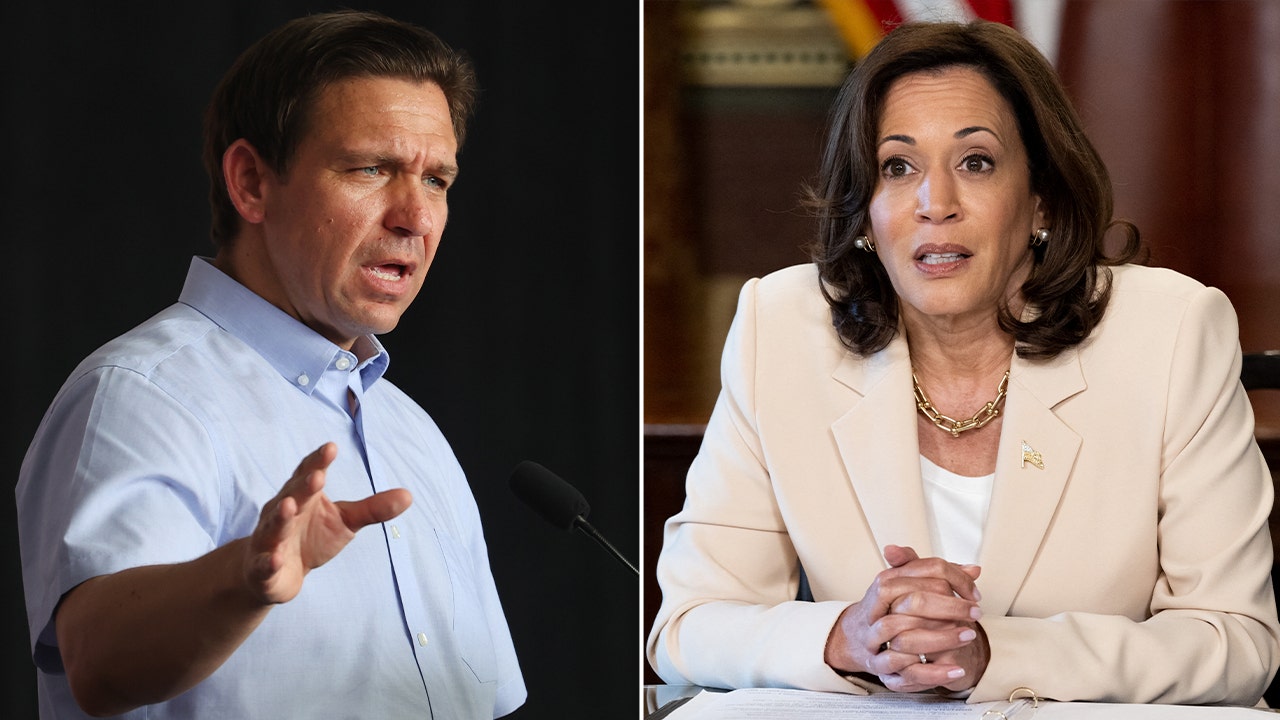Imagine, if you will, a political chess game where the pieces are state governors and the board is the future of the United States. In this game, one of the most intriguing moves was made in the summer of 2022 when Florida Governor Ron DeSantis sent a letter to Vice President Kamala Harris, a move that quickly captured the attention of the national media. This wasn’t just any letter; it was a bold declaration of Florida’s independence, a challenge to the Federal government, and a potential prelude to a larger political showdown.

Image: www.foxnews.com
This letter, sent in the midst of national debates over immigration and border security, exposed the growing divide between states and the Federal government, particularly on issues of policy and law enforcement. The letter served as a springboard for DeSantis’ national political ambitions, solidifying his image as a potent figure in the Republican Party and a formidable contender for the presidency in 2024. This article delves into the key content of the letter, its significance in the context of Florida’s unique political landscape, and its implications for the future of American politics.
The Content of the Letter: A Bold Statement of State Sovereignty
DeSantis’ letter to Kamala Harris, who at the time was tasked with overseeing the administration’s efforts on immigration, was a direct response to concerns regarding the growing influx of migrants at the southern border. The letter highlighted Florida’s significant contribution to national security and argued that the federal government’s approach to immigration was demonstrably ineffective, placing an undue burden on states like Florida. DeSantis went further, highlighting the impact of illegal immigration on Florida’s economy, healthcare system, and public safety. He explicitly stated his intention to take action to protect Florida’s interests, emphasizing the state’s authority to manage its own borders and control the movement of people within its territory.
The Letter’s Key Points:
- Strong criticism of the Federal government’s immigration policies: The letter accused the Biden administration of failing to secure the border and blamed the administration’s policies for contributing to the increase in illegal immigration.
- Florida’s commitment to enforcing its own immigration policies: DeSantis underscored Florida’s determination to enforce its own immigration laws and reiterated the state’s commitment to upholding the rule of law.
- A demand for greater federal assistance: DeSantis argued for increased federal funding to assist Florida in managing the influx of illegal immigrants and dealing with the strain on state resources.
The Significance of DeSantis’ Letter: A Political Chess Move
DeSantis’ letter to Harris was more than just a letter; it was a carefully orchestrated political move intended to achieve several critical goals. First, the letter aimed to solidify DeSantis’ image as a national leader with a strong stance on immigration, a key issue for many Republican voters. This move served to further alienate the GOP from the White House and build support for DeSantis as a contender for the presidency.
Second, the letter served to highlight DeSantis’ strong stance on state sovereignty, a principle embraced by many conservative voters. By highlighting the limitations of federal authority in dealing with immigration, DeSantis reinforced the idea that states have a right to make independent decisions regarding their own governance. This play resonated with many Republican voters who believe in limited government and individual liberty.
Third, the letter was a strategic attempt to shift the conversation on immigration away from the administration’s failures and towards the concerns of states like Florida. While the federal government focused on border security, DeSantis successfully pivoted the discussion to the real-world consequences of illegal immigration on states. This shift in focus allowed DeSantis to portray himself as a leader who is concerned with the day-to-day concerns of his constituents.

Image: 247newsaroundtheworld.com
The Letter’s Impact and the Future of American Politics
DeSantis’ letter had a significant impact, both in Florida and beyond. It sparked a national conversation about states’ rights, the limits of federal power, and the efficacy of immigration policy. The letter also prompted a strong backlash from the Biden administration, further solidifying the gap between the two parties.
The impact of DeSantis’ letter extends beyond the political realm. It has sparked practical policy changes in Florida, with the state implementing a series of measures aimed at cracking down on illegal immigration. These measures include increased border security, enhanced enforcement of immigration laws, and a renewed focus on deporting illegal immigrants. These policies have been met with both praise and criticism, highlighting the complex and highly polarized nature of the immigration debate in the United States.
Looking ahead, DeSantis’ letter is just one example of the growing trend of states challenging the authority of the federal government on issues ranging from immigration to healthcare. This trend is likely to continue, highlighting the ongoing struggle for power between states and the federal government.
Ron Desantis Letter To Kamala Harris
Conclusion: A Powerful Move in the Political Landscape
Ron DeSantis’ letter to Kamala Harris was a powerful move in the ongoing political chess game, a move that positioned DeSantis as a leader who is willing to challenge the Federal government and fight for the interests of his state. The letter served to energize his base, further solidify his national platform, and set the stage for future political battles. While the letter was just one action in a broader political landscape, it highlighted the complex and dynamic nature of American politics and the increasingly important role of states in the national dialogue. The future of American politics remains to be seen, but one thing is certain: the issue of state sovereignty, ignited by DeSantis’ letter, is likely to continue to be a defining issue in the years to come.






